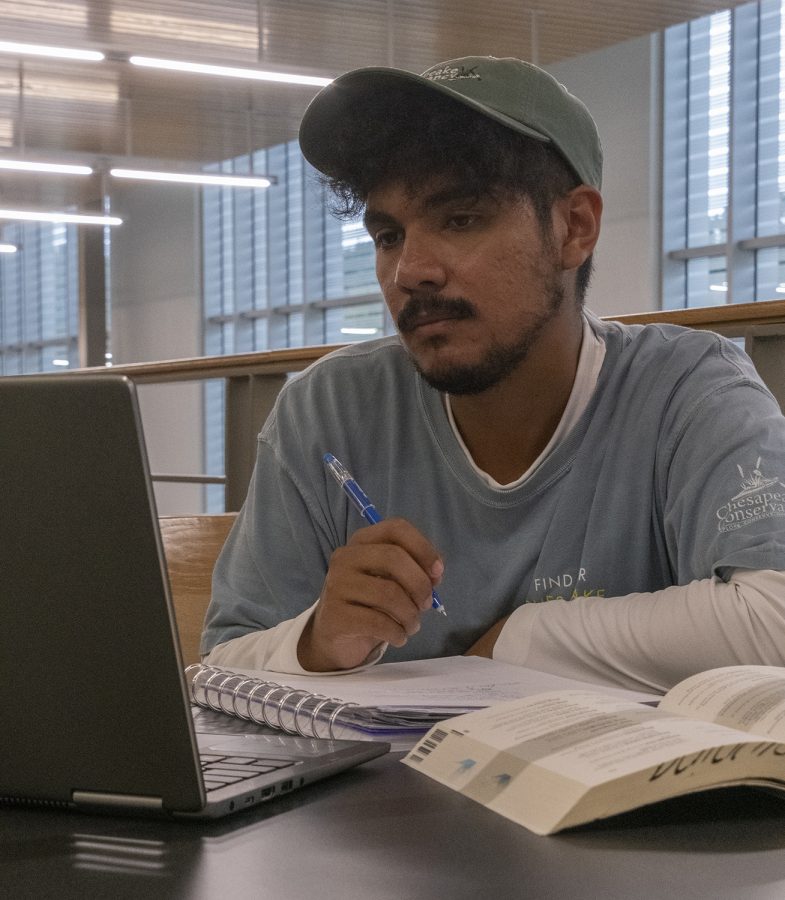AACC’s 1st generation students share stories
Daniel Salomon, a third-year transfer studies student, says he feels the pressure of becoming the first in his family to go to college.
August 21, 2019
Briana Barone nervously waited to speak to her mother. It was the day her college tuition payment was due.
Her heart raced as she waited by the door and wondered how she would frame the question, “Mom, can we afford this?”
Her mother, Ruth, had lost her job of 32 years as a shipping consultant two months before.
Barone said she told her mother she had $70 to put toward tuition, knowing it wasn’t enough.
Barone got the response she was least expecting.
“My mother smiled and told me that I shouldn’t worry about that,” she said. “[She said] that the money I had I should be saving for emergencies and a car.”
Now, Barone said, “I couldn’t be happier to be the first in my family to work toward a degree.”
About 25 percent of AACC students are the first in their families to attend college.
Daniel Salomon, a third-year transfer studies student, and his brother, Edgar Salomon, who graduated from AACC in 2018, are the first in their family to attend college.
Daniel Salomon said he feels like he has to be his own advocate at school because his parents, who didn’t have the chance to earn a higher education, never learned how to navigate the system.
“My parents are from Mexico,” Salomon said. “My mom didn’t finish the equivalent of high school in Mexico, and I’m not sure my dad did, either.”
He said although he takes pride in being a college student, a lot of pressure comes with it.
“I feel like I have a lot to live up to because of the education I can get,” Salomon said. “Not because of the pressure from my parents, because they’re pretty cool about the entire thing, [but] more from the … concept of it is like, ‘Oh man, I have to do really great or else I’m just not living up to being a first-generation college student.’ I have to do a really good job to get to where I want to or else I just didn’t do well.”
He said he felt undecided on his academic path when he came to AACC.
“I had ideas of what I was interested in, but no real goal,” said Salomon, who is studying media production.
Salomon said transitioning to college was difficult because he took a year off after graduating from high school.
The National Center for Education Statistics has reported that first-generation students enroll in college at lower rates than their peers whose parents attended college.
Barone, a third-year elementary education and communications student, said she plans to earn her degree no matter how long it takes.
She said her father dropped out of high school, while her mother went to work right after she graduated.
“I know that my parents are there to support me but I know they don’t necessarily, fully understand what it’s like sometimes,” Barone said. “I need their help. It’s not easy getting by in college alone.”
Barone said registering for classes and learning about financial aid wouldn’t be as difficult if her parents attended college because they could lend a helping hand.
“When I left high school, it was a whole battle of trying to understand how to do [financial aid] or how to even apply to colleges,” she said. “[My parents] just didn’t know.”
She said her parents pushed her to pursue college.
“It was unconditional support,” she said. “And it reminds me that what I’m doing is history defined. Nobody [in my family] has done it yet and that’s a huge, huge honor for me to carry.”
Joe Shenton, a third-year transfer studies student, said his parents, high school graduates, pushed him to go to college because “they wanted to raise me to be better than who they were when they were younger.”
Jenna Holthaus, who graduated with an associate degree in criminal justice in May, said she finds it liberating to achieve something her parents never did.
“It’s really cool that I’m the first one,” Holthaus said. “It really shows all the hard work that I’ve done to get here and to reach for an associate [degree.]”
Holthaus’s older brother, Jeremy, decided to go to trade school instead of pursuing a degree and his “pride is a little hurt that I got my degree before him, being the youngest in the family,” she said. “But I know he cares. He’s proud of me.”
She said money is always a difficult topic to discuss with her mom, a flight attendant, because she didn’t set aside money for college funds.
Dr. Deidra Dennie, AACC’s chief diversity officer, said first-generation students often are more self-sufficient than their classmates.
“These students end up having a lot of questions [about college] but they don’t know who to ask,” Dennie said. “So there’s a struggle for first-gen students … but after the first few weeks, they’re not missing a beat.”
She said navigating registration and scheduling can be difficult for these students because they don’t have anyone in their family to manage them through it.
“They may not know what to expect,” she said.












